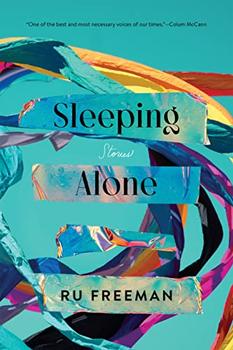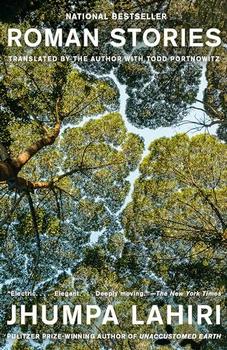Summary | Excerpt | Reviews | Beyond the book | Read-Alikes | Genres & Themes | Author Bio

Stories
by Ru FreemanRu Freeman's debut story collection gives dreamy attention to lives. Young or middle-aged, the characters in Sleeping Alone establish themselves in distant places and are catalyzed by separation and grief. Married or single, they are ordinary people in a perpetual drift, often dissatisfied. They are uncomfortable in their skins.
In the "The Irish Girl," a Sri Lankan man named Don rents a room in an ancestral Dublin house owned by Madailein. Shortly after his arrival, Madailein charms him with her friendly personality, more roommate than landlord: "I remember Madailein's first private words to me — their intimacy, their irreverence, how much they became her." They celebrate what they have in common: Both are 30-plus married drinkers who share a sense of sarcasm and wit. But when Madailein's husband moves out, her personality changes. Ambivalent and restrained, she stops singing, gives away her piano, and becomes polite and distant. She pushes everyone away, including Don, a crushing blow from which he never recovers. Just before he returns to Sri Lanka, Madailein says, "Maybe you'll come back, Don." He hears his friend speaking to him, but it is only the landlord, wishing him good stead. Don doesn't return to Ireland for 33 years.
Freeman is fascinated with how we hunker down in spaces where we live for long stretches of time. In "Retaining Walls," Jack and Ellen Stevenson, a middle-aged American couple, desire an addition to the back of their family home. They hire Saul, a 39-year-old contractor. As Saul traipses through their middle-class house, he notes the Stevensons' adult children in dated photographs. Their fourth child, Luke, is rarely mentioned other than Ellen saying, "he left us." Saul learns later that Luke killed himself. While the Stevensons can't speak of their son, Saul broods over his own wound: a difficult, fluttering marriage. He is loathe to admit the irony that his construction projects are works of art while his family is built on a flimsy foundation.
Literary beauty is subjective, but I personally grew fond of "Matthew's Story" and "Kobe Loves Me," each a sad profile of a young man in electrifying grief because of an untimely death that breaks him. Older brother Matthew loses younger brother Gabriel, and the funeral curiously takes place on what was to be Gabriel's wedding day. More than a man was lost. An entire future of love and commitment and the children that will never be born haunt the surviving brother, who was supposed to be the protector.
Similarly immobile from loss, Rickey continually reflects on two moments. The time he met his hero Kobe Bryant and received a monumental hug. And the day Kobe died in a disastrous crash, leaving Rickey feeling like he had lost a member of his own family: "Kobe had been their reason. Kobe had been their person. The one in their corner. A Black king who turned Black boys into princes with his eyes, his words, his tough."
Matthew and Rickey drift in and out of grief's horrible waves, having to manage their suffering alongside the absence of fathers, and feeling a sense of aloneness because no one can strip away what is making them mourn so terribly. That they are men who openly loved these other men adds beauty to such sad tales of sudden death.
A complicated story about social isolation, "The Bridge" centers a lonely anti-war teacher who is infatuated with one of his teenaged students. Mr. Solmitz is a military veteran and outcast with a horrifying past who makes questionable decisions, like using photographic props to teach his students the tough lessons of war. The other teachers mock him, so he is mostly alone. The student he claims to love is shunned as well: No one really likes Sophie Laliberte. Freeman writes Mr. Solmitz's story in the first person, but with emotional minimalism. "The Bridge" lacks the literary fluency of the rest of the collection, particularly considering that Mr. Solmitz is a character you'd hope to have more insight into.
It has often been said that the short story is a love affair while the novel is a marriage. You enter a short story and then you leave. You attach to the characters and their lives and then you dispose of them. But if short stories are about the weight of the human experience, then Freeman's collection is a great contribution to the genre. Born in Sri Lanka, she deftly handles elements of culture threaded through her African American, Caucasian, Irish and Sri Lankan protagonists. While reading, I had the sensation that someone was whispering in my ear about the people they met all over the world, the ones they were unable to forget.
What makes the collection so engrossing are the conflicts. A girl kicked out of her bedroom, now having to sleep on the floor. A woman of color being profiled as a nanny. Freeman's gift is the ability to leverage triumph from rejection and disappointment. She breathes loss and gain, love and hurt, into her characters' mouths as if resuscitating them. She keeps them alive so we can know them intimately and in turn know her. Her language makes it seem so simple — how to love the fractured and hopeful people in this mystifying and gracious world and how to love ourselves when we are with them.
![]() This review
first ran in the August 3, 2022
issue of BookBrowse Recommends.
This review
first ran in the August 3, 2022
issue of BookBrowse Recommends.

If you liked Sleeping Alone, try these:

by Jhumpa Lahiri
Published 2024
The first short story collection by the Pulitzer Prize–winning author and master of the form since her number one New York Times best seller Unaccustomed Earth • Rome—metropolis and monument, suspended between past and future, multi-faceted and metaphysical—is the protagonist, not the setting, of these nine stories

by Uche Okonkwo
Published 2024
A searing, unflinching collection of stories set in Nigeria that explores themes of community expectations, familial strife, and the struggle for survival.
Your guide toexceptional books
BookBrowse seeks out and recommends the best in contemporary fiction and nonfiction—books that not only engage and entertain but also deepen our understanding of ourselves and the world around us.